24 Hours Hotline: +86 137-3541-1378
Email:suzhou@tripstoshanghai.com
24 Hours Hotline: +86 137-3541-1378
Email:suzhou@tripstoshanghai.com
A Brief Introdution of China Festival
Boasting rich cultural meaning and a long history, traditional Chinese festivals compose an important and brilliant part of Chinese culture. Most traditional festivals took shape during the Qin Dynasty (221-206 BC). In the most prosperous Tang Dynasty (AD 618-907), traditional festivals liberated themselves from primitive sacrifice, taboo and mystery and became more entertaining. From then on, festive occasions turned more brisk and exciting and more and more folk customs were developed.
The Most Important Chinese Festival.
Spring Festival
The Spring Festival is the most important festival for the Chinese people and is when all family members get together, just like Christmas in the West. All people living away from home go back, becoming the busiest time for transportation systems of about half a month from the Spring Festival. Airports, railway stations and long-distance bus stations are crowded with home returnees.
The Spring Festival falls on the 1st day of the 1st lunar month, often one month later than the Gregorian calendar. It originated in the Shang Dynasty (c. 1600 BC-c. 1100 BC) from the people's sacrifice to gods and ancestors at the end of an old year and the beginning of a new one.
Strictly speaking, the Spring Festival starts every year in the early days of the 12th lunar month and will last till the mid 1st lunar month of the next year. Of them, the most important days are Spring Festival Eve and the first three days. The Chinese government now stipulates people have seven days off for the Chinese Lunar New Year.
People begin decorating their clean rooms featuring an atmosphere of rejoicing and festivity. All the door panels will be pasted with Spring Festival couplets, highlighting Chinese calligraphy with black characters on red paper. The content varies from house owners' wishes for a bright future to good luck for the New Year. Also, pictures of the god of doors and wealth will be posted on front doors to ward off evil spirits and welcome peace and abundance.
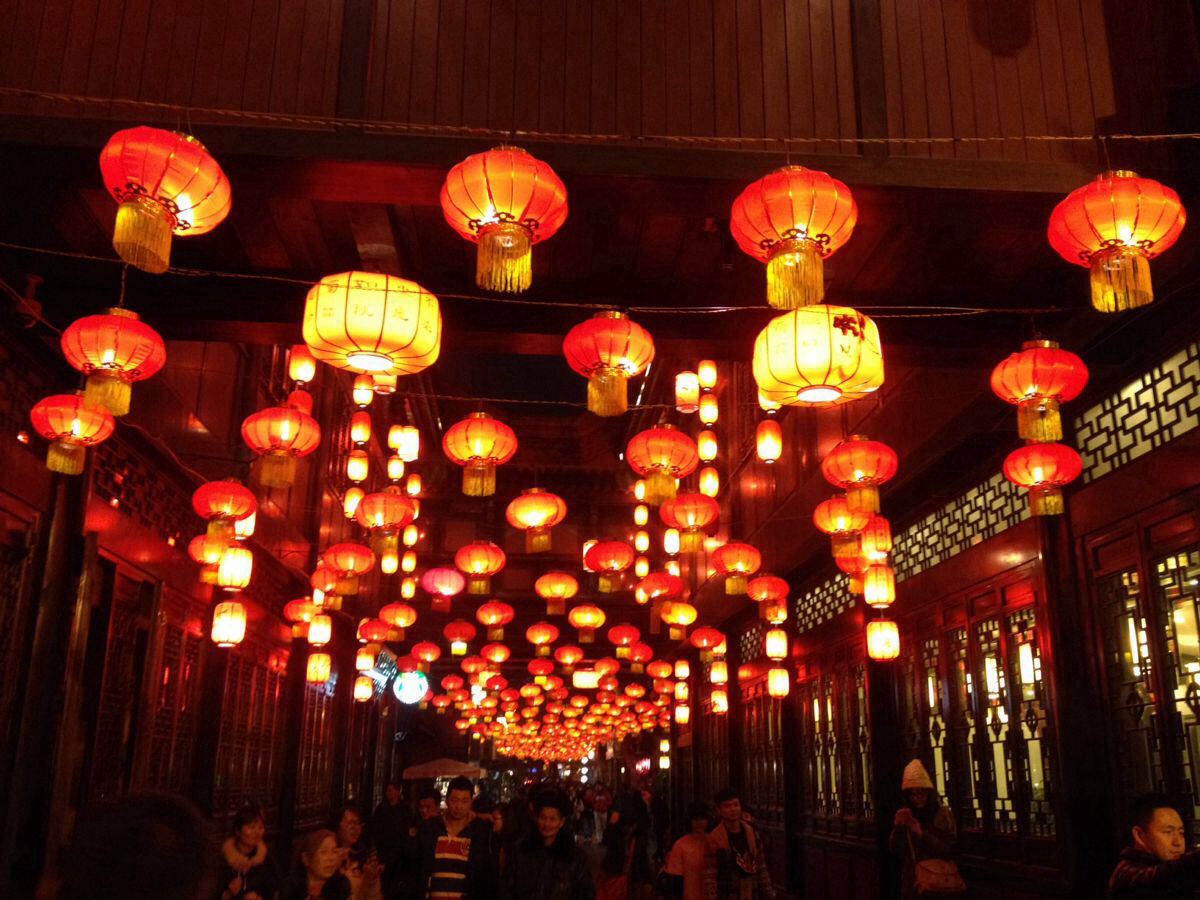
Lantern Festival
The Lantern Festival falls on the 15th day of the 1st lunar month, usually in February or March in the Gregorian calendar. As early as the Western Han Dynasty (206 BC-AD 25), it had become a festival with great significance.
This day's important activity is watching lanterns. Throughout the Han Dynasty (206 BC-AD 220), Buddhism flourished in China. One emperor heard that Buddhist monks would watch sarira, or remains from the cremation of Buddha's body, and light lanterns to worship Buddha on the 15th day of the 1st lunar month, so he ordered to light lanterns in the imperial palace and temples to show respect to Buddha on this day. Later, the Buddhist rite developed into a grand festival among common people and its influence expanded from the Central Plains to the whole of China.
People will eat yuanxiao, or rice dumplings, on this day, so it is also called the "Yuanxiao Festival."Yuanxiao also has another name, tangyuan. It is small dumpling balls made of glutinous rice flour with rose petals, sesame, bean paste, jujube paste, walnut meat, dried fruit, sugar and edible oil as filling. Tangyuan can be boiled, fried or steamed. It tastes sweet and delicious. What's more, tangyuan in Chinese has a similar pronunciation with "tuanyuan”, meaning reunion. So people eat them to denote union, harmony and happiness for the family.
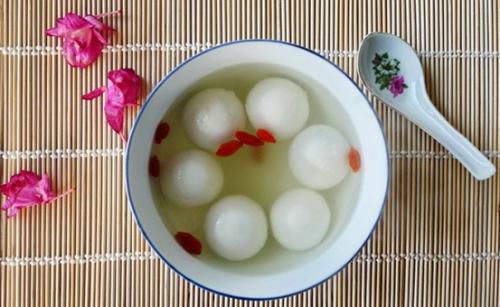
Qingming Festival (Sweeping Tomb Festival)
The Qingming (Pure Brightness) Festival is one of the 24 seasonal division points in China, falling on April 4-6 each year. After the festival, the temperature will rise up and rainfall increases. It is the high time for spring plowing and sowing. But the Qingming Festival is not only a seasonal point to guide farm work, it is more a festival of commemoration.
This is the most important day of sacrifice. Both the Han and minority ethnic groups at this time offer sacrifices to their ancestors and sweep the tombs of the deceased. Also, they will not cook on this day and only cold food is served.
The Hanshi (Cold Food) Festival was usually one day before the Qingming Festival. As our ancestors often extended the day to the Qingming, they were later combined.
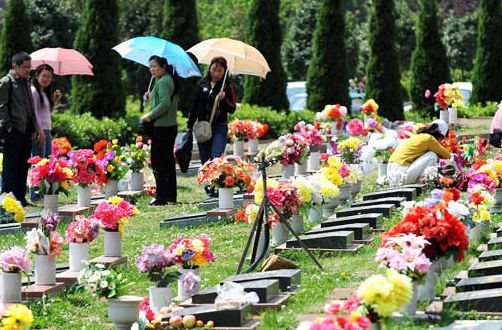
Dragon Boat Festival
The Dragon Boat Festival, the 5th day of the 5th lunar month, has had a history of more than 2,000 years. It is usually in June in the Gregorian calendar.
There are many legends about the evolution of the festival, the most popular of which is in commemoration of Qu Yuan (340-278 BC). Qu Yuan was minister of the State of Chu and one of China's earliest poets. In face of great pressure from the powerful Qin State, he advocated enriching the country and strengthening its military forces so as to fight against the Qin. However, he was opposed by aristocrats headed by Zi Lan, and later deposed and exiled by King Huai. In his exiled days, he still cared much for his country and people and composed immortal poems including Li Sao (The Lament), Tian Wen (Heavenly Questions) and Jiu Ge (Nine Songs), which had far-reaching influences. In 278 BC, he heard the news that Qin troops had finally conquered Chu's capital, so he finished his last piece Huai Sha (Embracing Sand) and plunged himself into the Miluo River, clasping his arms to a large stone. The day happened to be the 5th of the 5th month in the Chinese lunar calendar. After his death, the people of Chu crowded to the bank of the river to pay their respects to him. The fishermen sailed their boats up and down the river to look for his body. People threw into the water zongzi (pyramid-shaped glutinous rice dumplings wrapped in reed or bamboo leaves) and eggs to divert possible fish or shrimp from attacking his body. An old doctor poured a jug of reaglar wine (Chinese liquor seasoned with realgar) into the water, hoping to turn all aquatic beasts drunk. That's why people later followed the customs such as dragon boat racing, eating zongzi and drinking realgar wine on that day.
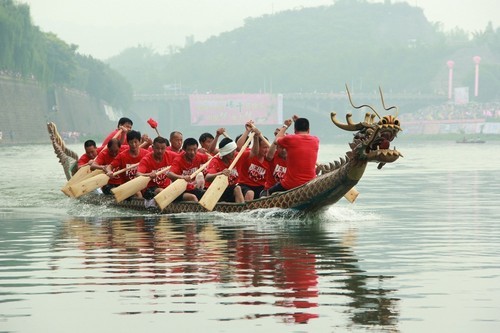
Double Seventh Festival
The Double Seventh Festival, on the 7th day of the 7th lunar month, is a traditional festival full of romance. It often goes into August in the Gregorian calendar.
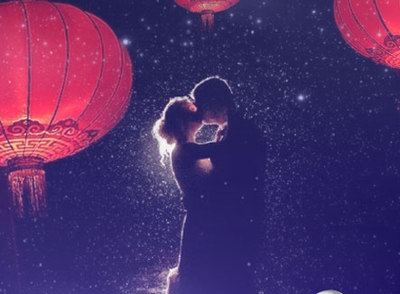
This festival is in mid-summer when the weather is warm and the grass and trees reveal their luxurious greens. At night when the sky is dotted with stars, and people can see the Milky Way spanning from the north to the south. On each bank of it is a bright star, which see each other from afar. They are the Cowherd and Weaver Maid, and about them there is a beautiful love story passed down from generation to generation.
Long, long ago, there was an honest and kind-hearted fellow named Niu Lang (Cowhand). His parents died when he was a child. Later he was driven out of his home by his sister-in-law. So he lived by himself herding cattle and farming. One day, a fairy from heaven Zhi Nu (Weaver Maid) fell in love with him and came down secretly to earth and married him. The cowhand farmed in the field and the Weaver Maid wove at home. They lived a happy life and gave birth to a boy and a girl. Unfortunately, the God of Heaven soon found out the fact and ordered the Queen Mother of the Western Heavens to bring the Weaver Maid back.
This festival is in mid-summer when the weather is warm and the grass and trees reveal their luxurious greens. At night when the sky is dotted with stars, and people can see the Milky Way spanning from the north to the south. On each bank of it is a bright star, which see each other from afar. They are the Cowherd and Weaver Maid, and about them there is a beautiful love story passed down from generation to generation.
Mid-Autumn Festival
The festival has a long history. In ancient China, emperors followed the rite of offering sacrifices to the sun in spring and to the moon in autumn. Historical books of the Zhou Dynasty had had the word "Mid-Autumn". Later aristocrats and literary figures helped expand the ceremony to common people. They enjoyed the full, bright moon on that day, worshipped it and expressed their thoughts and feelings under it. By the Tang Dynasty (618-907), the Mid-Autumn Festival had been fixed, which became even grander in the Song Dynasty (960-1279). In the Ming (1368-1644) and Qing (1644-1911) dynasties, it grew to be a major festival of China.
Folklore about the origin of the festival go like this: In remote antiquity, there were ten suns rising in the sky, which scorched all crops and drove people into dire poverty. A hero named Hou Yi was much worried about this, he ascended to the top of the Kunlun Mountain and, directing his superhuman strength to full extent, drew his extraordinary bow and shot down the nine superfluous suns one after another. He also ordered the last sun to rise and set according to time. For this reason, he was respected and loved by the people and lots of people of ideals and integrity came to him to learn martial arts from him. A person named Peng Meng lurked in them.
When people heard of the story that Chang E had turned into a celestial being, they arranged the incense table in the moonlight one after another and prayed kindhearted Chang E for good fortune and peace. From then on the custom of worshiping the moon spread among the people.
People in different places follow various customs, but all show their love and longing for a better life. Today people will enjoy the full moon and eat moon cakes on that day.
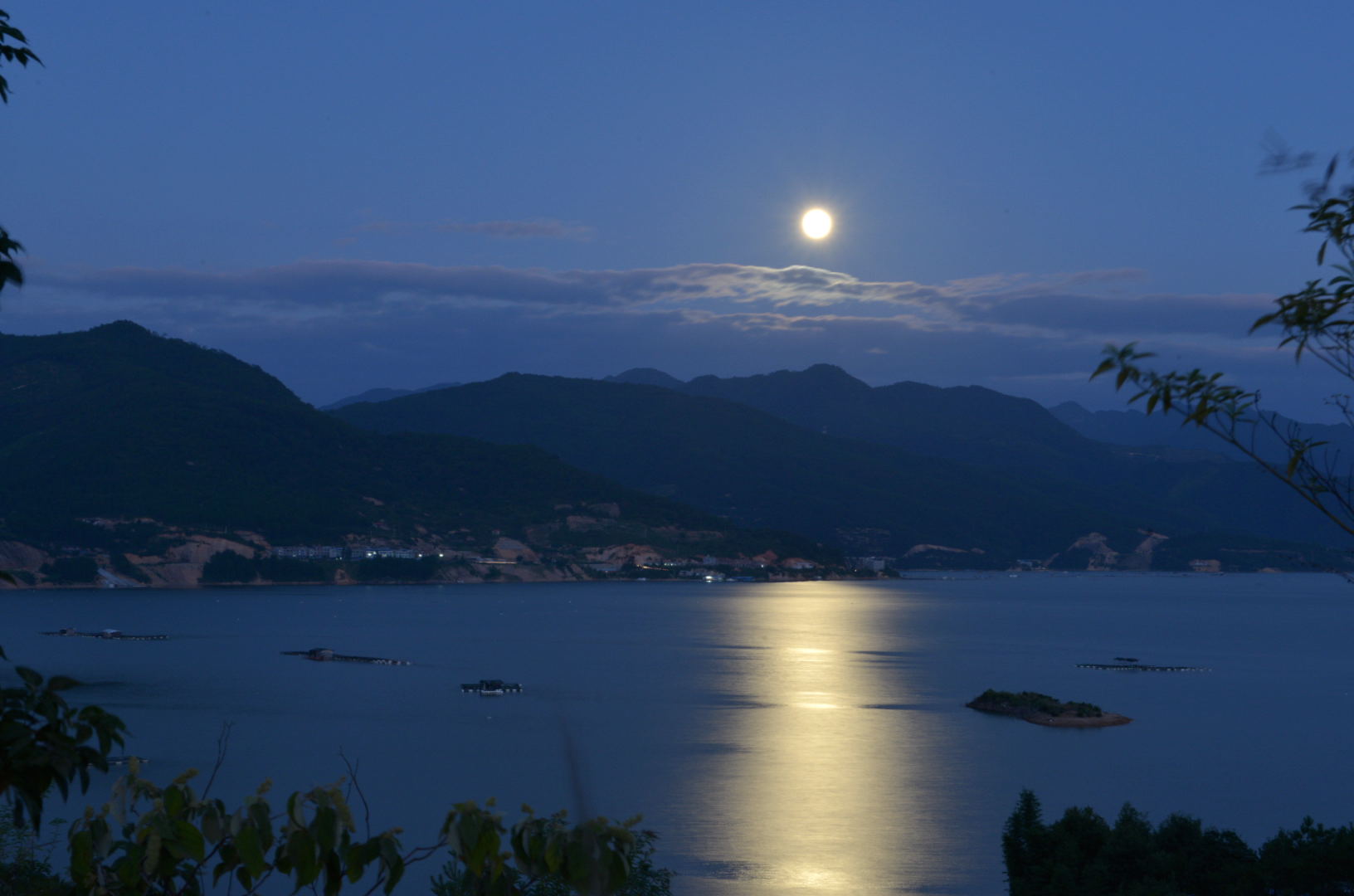
Double Ninth Festival
The 9th day of the 9th lunar month is the traditional Chongyang Festival, or Double Ninth Festival. It usually falls in October in the Gregorian calendar. In an ancient and mysterious book Yi Jing, or The Book of Changes, number "6" was thought to be of Yin character, meaning feminine or negative, while number "9" was thought to be Yang, meaning masculine or positive. So the number nine in both month and day create the Double Ninth Festival, or Chongyang Festival. Chong in Chinese means "double." Also, as double ninth was pronounced the same as the word to signify "forever", both are "Jiu Jiu," the Chinese ancestors considered it an auspicious day worth celebration. That's why ancient Chinese began to celebrate this festival long time ago.
On this day, people will eat Double Ninth Gao (or Cake). In Chinese, gao (cake) has the same pronunciation with gao (height). People do so just to hope progress in everything they are engaged in. There is no fixed ways for the Double Ninth Cake, but super cakes will have as many as nine layers, looking like a tower.
Winter Solstice Festival
As early as 2,500 years ago, about the Spring and Autumn Period (770-476 BC), China had determined the point of Winter Solstice by observing movements of the sun with a sundial. It is the earliest of the 24 seasonal division points. The time will be each December 21 or 22 according to the Gregorian calendar.
The Northern hemisphere on this day experiences the shortest daytime and longest nighttime. After the Winter Solstice, days will become longer and longer. As ancient Chinese thought, the yang, or muscular, positive things will become stronger and stronger after this day, so it should be celebrated.
The Winter Solstice became a festival during the Han Dynasty (206 BC-220 AD) and thrived in the Tang and Song dynasties (618-1279). The Han people regarded Winter Solstice as a "Winter Festival", so officials would organize celebrating activities. On this day, both officials and common people would have a rest. The army was stationed in, frontier fortresses closed and business and traveling stopped. Relatives and friends presented to each other delicious food. In the Tang and Song dynasties, the Winter Solstice was a day to offer scarifies to Heaven and ancestors. Emperors would go to suburbs to worship the Heaven; while common people offered sacrifices to their deceased parents or other relatives. The Qing Dynasty (1644-1911) even had the record that "Winter Solstice is as formal as the Spring Festival," showing the great importance attached to this day.
Wechat: Chinaprivatetour
24 Hours Hotline:
+86 137-3541-1378
* Authentic Experiences: Genuine local experiences that immerse you in the true essence of Suzhou and beyond.
* Safety First: Highest safety standards with secure activities and reliable transportation.
* Customizable Tours: Flexible itineraries tailored to your interests and needs.
* Local Expertise: In-depth knowledge of Suzhou and China, offering exclusive insights.
* Professional Guides: Licensed bilingual guides with over 5 years of experience.
* Comfortable Travel: Experienced drivers and well-maintained vehicles for a smooth journey.
* Sustainable Tourism:Commitment to responsible tourism and supporting local communities.
* Customer-Focused: Personalized service and continuous improvement based on your feedback.
* Free Cancellation: Cancel up to 24 hours before travel for flexibility and peace of mind.
* 24/7 Support: Round-the-clock assistance for any questions or help needed.
 Tiger Hill (Huqiu) Travel Guide: Exploring Suzhou’s Iconic Leaning Pagoda
Tiger Hill (Huqiu) Travel Guide: Exploring Suzhou’s Iconic Leaning Pagoda Exploring Suzhou No. 1 Silk Factory: A Journey into the Heart of China’s Silk Industry
Exploring Suzhou No. 1 Silk Factory: A Journey into the Heart of China’s Silk Industry Exploring Guanqian Street in Suzhou: A Blend of Tradition, Shopping, and Local Flavors
Exploring Guanqian Street in Suzhou: A Blend of Tradition, Shopping, and Local Flavors Humble Administrator’s Garden Suzhou: Complete Visitor Guide to Zhuozheng Garden, History, Highlights & Tips
Humble Administrator’s Garden Suzhou: Complete Visitor Guide to Zhuozheng Garden, History, Highlights & Tips Song He Lou Suzhou: A Culinary Journey through Suzhou’s Historic Songhelou Restaurant
Song He Lou Suzhou: A Culinary Journey through Suzhou’s Historic Songhelou Restaurant Yangcheng Lake Hairy Crab Guide: The King of Crabs in China
Yangcheng Lake Hairy Crab Guide: The King of Crabs in China Master of the Nets Garden Suzhou: A Complete Guide to China’s Most Exquisite Classical Night Garden
Master of the Nets Garden Suzhou: A Complete Guide to China’s Most Exquisite Classical Night Garden Jinji Lake Suzhou Travel Guide: What to See and Do Around Suzhou’s Modern Landmark
Jinji Lake Suzhou Travel Guide: What to See and Do Around Suzhou’s Modern Landmark1 to 1 tailor-made service from our professional travel advisors for the most sophisticated
Constantly excellent reviews for attraction, hotel and service Competitive price
Local experts provide quality tours Best selected knowledgeable local guides Authentic local restaurants
7*24 hours available to create you a worry-free tour. No Hidden Fees and absolutely no pressure to buy. Secured









Copyright © 2017 Suzhouprivatetour.com All rights reserved. 浙ICP备18056007号-4